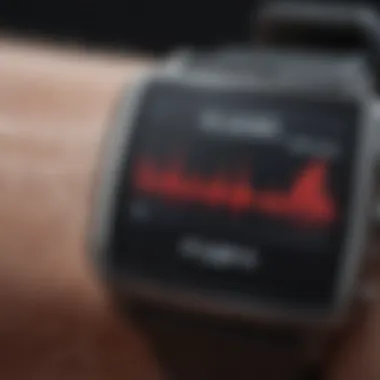Exploring the Link Between Stress and Blood Pressure


Intro
The link between stress and blood pressure has been a focal point of various studies. Understanding this relationship is vital for enhancing cardiovascular health and overall well-being. Psychological stressors can significantly influence how our bodies function, particularly in terms of blood pressure regulation. The intricacies of this connection unfold at multiple levels, from behavioral changes to physiological responses.
In this article, we will explore how chronic stress impacts blood pressure, and the underlying biological mechanisms involved. By comprehensively examining the research surrounding this topic, we will uncover critical insights that are valuable for students, researchers, educators, and healthcare professionals alike.
Understanding Blood Pressure
Understanding blood pressure is crucial, particularly in the context of stress and its implications for cardiovascular health. Blood pressure essentially refers to the force exerted by circulating blood on the walls of blood vessels. This measurement is typically recorded with two numbers, measured in millimeters of mercury (mmHg). The higher number, systolic pressure, indicates the force when the heart beats, while the lower number, diastolic pressure, shows the pressure when the heart is at rest between beats.
The significance of blood pressure regulation cannot be overstated. High blood pressure, or hypertension, can lead to serious health issues, including heart disease, stroke, and kidney damage. Conversely, low blood pressure, or hypotension, also presents risks, though less talked about, such as dizziness or fainting. Understanding how stress influences blood pressure levels ultimately underlines the importance of both managing stress and monitoring blood pressure over time.
Physiology of Blood Pressure Regulation
Blood pressure regulation is a complex process involving multiple systems within the body, namely the cardiovascular system, the nervous system, and the endocrine system. The autonomic nervous system plays a major role in this regulation. It has two branches: the sympathetic and the parasympathetic. The sympathetic nervous system initiates the ‘fight or flight’ response during stressful situations, leading to increased heart rate and constriction of blood vessels. This results in higher blood pressure. Conversely, the parasympathetic nervous system works to lower the heart rate and dilate blood vessels, thereby decreasing blood pressure in non-stressful conditions.
Hormones also significantly influence blood pressure regulation. For instance, epinephrine and norepinephrine are released during stress, further elevating blood pressure. Similarly, the kidneys regulate blood volume through the renin-angiotensin-aldosterone system, adjusting blood pressure dynamics based on fluid status in the body.
Normal vs. Abnormal Blood Pressure Levels
Blood pressure readings are categorized as normal or abnormal based on defined medical criteria. Generally, a normal reading is considered to be below 120/80 mmHg. Elevated blood pressure starts at 120-129 systolic and less than 80 diastolic, while stage 1 hypertension is defined as 130-139 systolic or 80-89 diastolic. Stage 2 hypertension, a more severe form, consists of 140 or higher systolic or 90 or higher diastolic.
Abnormalities in blood pressure can arise from various factors, including lifestyle choices, genetic predispositions, and acute or chronic stress. For example, stress can lead to temporary spikes in blood pressure, while chronic stress may contribute to long-term hypertension. Monitoring these fluctuations in blood pressure is important not just for individuals experiencing stress but also for general cardiovascular health.
Defining Stress
Understanding stress is pivotal in the investigation of its relationship with blood pressure. Stress is not just a simple feeling but a complex interplay of biological, psychological, and social factors that collectively impact health. By defining stress, we can identify its various components and how they affect physical well-being, particularly the regulation of blood pressure.
Types of Stress: Acute vs. Chronic
Stress can be categorized into two primary types: acute and chronic.
- Acute stress is what most people experience daily. It typically arises from specific challenges or threats that are temporary in nature. For instance, a looming deadline or an unexpected confrontation can trigger a short burst of stress that is manageable.
- In contrast, chronic stress lasts for an extended period and often relates to ongoing issues such as financial difficulties, job dissatisfaction, or long-term caregiving. This prolonged state can lead to serious health effects. Studies indicate that chronic stress can elevate blood pressure consistently, posing risks for cardiovascular diseases.
Recognizing the difference between these two types allows individuals and professionals to implement targeted stress management strategies effectively.
Psychological vs. Physical Stress
Stress can also be categorized based on its source, namely psychological and physical stress.
- Psychological stress originates from mental or emotional challenges. Examples include relationship problems or workplace conflicts. This type of stress often engages the mind more intensely, leading to feelings of anxiety or depression. It can directly affect blood pressure by triggering the body’s stress response mechanisms.
- Physical stress, on the other hand, results from bodily challenges. This may be due to illness, injury, or strenuous exercise. Although physical stress can be beneficial in moderation, excessive physical stress can strain the body and lead to elevated blood pressure levels.
Understanding these distinctions is crucial for tailoring interventions and strategies for stress reduction.
Key Takeaway: Recognizing the forms and origins of stress is essential for effective management and can have significant implications for blood pressure control and overall cardiovascular health.
Mechanisms Linking Stress to Blood Pressure
Understanding the mechanisms that link stress to blood pressure is crucial for grasping how various forms of stress can impact cardiovascular health. Stress triggers a complex interplay within the body that can lead to physiological changes. These changes include increased heart rate, elevated blood pressure, and responses in blood vessels. Exploring these mechanisms provides insight into why managing stress is essential to prevent long-term health issues related to elevated blood pressure.
Stress activates both the autonomic nervous system and hormonal responses that work together to elevate blood pressure. This relationship underscores the importance of recognizing these stressors in daily life. Different types of stressors—be they short-term or chronic—may yield varying effects on blood pressure. Understanding these dynamics informs healthcare strategies aimed at minimizing stress-related health risks.
The Role of the Autonomic Nervous System


The autonomic nervous system (ANS) is a critical player in the body's response to stress. It consists of two main components: the sympathetic and parasympathetic nervous systems. The sympathetic nervous system kicks in during stressful situations, preparing the body for a fight-or-flight response. This activation results in an increase in heart rate, constriction of blood vessels, and ultimately, higher blood pressure.
The parasympathetic nervous system, on the other hand, promotes a relaxed state. If the sympathetic system dominates, it may cause an imbalance over time, leading to chronic high blood pressure. This cyclical pattern emphasizes the need for stress management techniques, as interventions can help restore this balance.
"Regulating the autonomic nervous system is fundamental for maintaining healthy blood pressure levels."
Hormonal Regulation During Stress Response
Hormonal responses also play a significant role in linking stress to blood pressure. When faced with stress, the body releases hormones such as cortisol, adrenaline, and norepinephrine. These hormones prepare the body for immediate action but can cause prolonged effects on blood pressure if stress remains unmanaged.
Cortisol, for example, can persist in the bloodstream over time, resulting in chronic elevation of blood pressure. In contrast, adrenaline triggers rapid heart rhythms and vascular constriction. This dual effect illustrates how stress hormones can contribute to both immediate and long-standing changes in blood pressure. Furthermore, prolonged activation of these hormonal systems can lead to conditions like hypertension.
Evidence of Stress-Induced Blood Pressure Elevation
The relationship between stress and blood pressure is both significant and complex. Understanding the evidence of stress-induced blood pressure elevation is essential for comprehending how psychological and physical stresses can affect cardiovascular health. Stress results in various biological changes that can alter blood pressure regulation. These alterations can have both immediate and long-term consequences on an individual's health and well-being. This section will focus on various dimensions related to the impact of stress on blood pressure, providing critical insights for students, researchers, and healthcare professionals.
Short-Term Stress Responses and Blood Pressure
When the body encounters acute stressors, a series of physiological changes occur. The sympathetic nervous system triggers the release of stress hormones, like adrenaline and cortisol. These hormones lead to an increase in heart rate and force of contraction, which can result in a rapid rise in blood pressure. This response is often seen in situations such as public speaking or facing immediate threats.
In the short term, this elevation in blood pressure can be beneficial, as it prepares the body for a fight or flight response. However, repeated episodes of acute stress can lead to persistent elevations in blood pressure, which is not healthy. Studies indicate that individuals exposed to short-term stress tend to show temporary spikes in their blood pressure readings, raising concern about the long-term effects of such stressors.
Research has shown that individuals with high levels of acute stress demonstrate a steeper increase in blood pressure compared to those with lower stress levels.
Long-Term Impacts of Chronic Stress on Blood Pressure
Chronic stress, which persists over time, can have drastic impacts on blood pressure regulation. Unlike short-term stress, chronic stress keeps the sympathetic nervous system in a heightened state of activity. This continuous activation results in consistently elevated hormones like cortisol in the bloodstream. Over time, this may contribute to sustained high blood pressure, known as hypertension.
Research shows that people who experience chronic life stresses, such as job-related stress or ongoing interpersonal conflicts, are at a higher risk of developing hypertension. Factors like poor coping mechanisms and lack of social support can aggravate these effects.
Moreover, chronic stress has been linked to lifestyle factors such as poor diet and lack of exercise, which can further compound the risk of high blood pressure. It is essential to acknowledge that managing chronic stress effectively may help mitigate its impact on blood pressure. Establishing coping strategies and seeking support can be critical steps in preserving cardiovascular health.
Research Studies on Stress and Blood Pressure
Research on the relationship between stress and blood pressure is critical for understanding cardiovascular health. The impact of stress on blood pressure is not just a theoretical concern; numerous studies show clear links between these two factors. Both acute and chronic stress can lead to significant changes in blood pressure, affecting individuals’ long-term health outcomes. Investigating this relationship deepens our understanding of how lifestyle and psychological factors influence cardiovascular disease.
One essential aspect of these research studies is the varied methodologies employed to assess both stress and blood pressure. Recognizing the strengths and limitations of each approach can provide insights into the accuracy of findings.
Methodologies for Measuring Stress and Blood Pressure
Different methodologies have been devised to measure stress levels and blood pressure in clinical and research settings. Blood pressure is usually measured using sphygmomanometers or digital monitors. The accuracy of measurements is crucial, as even slight variances can impact study outcomes.
When it comes to measuring stress, researchers may employ various techniques:
- Self-report questionnaires: Instruments like the Perceived Stress Scale (PSS) allow individuals to self-assess their stress levels.
- Physiological measures: These include heart rate variability, cortisol levels, or galvanic skin response. Each of these reflects physiological changes associated with stress.
- Behavioral observations: Researchers might analyze coping mechanisms or behavioral changes resulting from stressors.
Combining these methodologies provides a comprehensive view of how stress may impact blood pressure dynamically.
Findings from Longitudinal Studies
Longitudinal studies offer invaluable insights into the relationship between stress and blood pressure, as they track individuals over extended periods. This allows researchers to observe changes that occur in response to stress and how these changes relate to blood pressure over time.
Some critical findings from these studies include:


- Individuals experiencing chronic stress often show consistently elevated blood pressure readings compared to their less stressed counterparts.
- Specific stressors, like job strain or relationship issues, have been identified as significant risk factors for developing hypertension.
- Conversely, effective stress management techniques can lead to marked improvements in blood pressure control.
Understanding these long-term effects of stress is essential for developing effective interventions aimed at mitigating hypertension.
Individual Differences in Stress Response
Understanding the individual differences in stress response is crucial in the context of blood pressure regulation. The way a person handles stress does not solely depend on the stressful event but also on internal factors, including genetics, psychology, and environment. Each person's physiological and psychological make-up influences how stress affects their blood pressure. This variation can predispose individuals to heart disease or even affect their recovery from stress-related incidents. Recognizing these differences can guide both prevention and treatment strategies for managing hypertension, leading to better health outcomes.
Genetic Factors Influencing Stress Responses
Genetic factors play a significant role in how individuals respond to stress. Research has shown that certain genes can influence the nervous system's reaction and the hormonal responses provoked by stress. For example, variations in the gene that encodes for the enzyme catechol-O-methyltransferase (COMT) can affect how efficiently the body breaks down dopamine. This neurotransmitter is involved in the stress response and can impact blood pressure. Moreover, genetic predisposition may affect the production of glucocorticoids, further influencing how one experiences and processes stress.
In essence, some people may be genetically primed to experience a more pronounced increase in blood pressure when faced with stressors. This genetic variation highlights the importance of personalized approaches in managing stress and its effects on blood pressure.
Psychosocial Factors and Their Impact
In addition to genetic factors, psychosocial elements are equally pivotal in shaping an individual's response to stress. The environment, culture, and personal history can greatly influence how stress is perceived and managed. For example, a supportive social network can mitigate stress effects, whereas isolation can amplify them.
Coping mechanisms also vary widely among individuals. Some might employ effective strategies, such as mindfulness or problem-solving, while others might resort to unhealthy behaviors like smoking or overeating. These factors can lead to different blood pressure outcomes.
Furthermore, an individual’s personality traits, such as resilience or a tendency toward anxiety, can uniquely alter their stress responses. Research suggests that people with high levels of resilience tend to have better cardiovascular health, as they are less likely to exhibit stress-induced hypertension.
In summary, exploring individual differences in stress response reveals a complex interplay of genetic and psychosocial factors. Recognizing these nuances can foster a better understanding of how stress impacts blood pressure, ultimately leading to more effective health interventions.
Practical Implications for Managing Stress and Blood Pressure
The connection between stress and blood pressure highlights the necessity for effective management strategies in both areas. Increased stress can lead to elevated blood pressure, creating higher risks for cardiovascular diseases. Understanding how to handle stress effectively could therefore directly influence blood pressure levels positively. This section encompasses specific techniques for stress reduction and key lifestyle changes that can support better blood pressure management.
Stress Reduction Techniques
Reducing stress is paramount in maintaining optimal blood pressure levels. Here are some techniques that individuals can incorporate into their daily routines:
- Mindfulness Meditation: This practice emphasizes breathing and awareness. It helps individuals stay present and reduce anxiety, ultimately leading to lower stress levels and better blood regulation.
- Progressive Muscle Relaxation: This involves tensing and then relaxing different muscle groups. It can diminish tension in the body and foster a hormonally balanced state.
- Engagement in Physical Activity: Regular exercise, such as walking or aerobic activities, is scientifically proven to alleviate stress and boost mood. Exercise triggers the release of endorphins, improving mental health.
- Deep Breathing Exercises: These exercises can be done anywhere and provide immediate stress relief. Deep breathing helps calm the nervous system.
Incorporating these techniques can transform how individuals respond to daily stressors, influencing blood pressure in a beneficial way.
Lifestyle Changes to Improve Blood Pressure
Adapting one's lifestyle is another crucial aspect of managing blood pressure in relation to stress. Various modifications can yield significant health benefits:
- Adopt a Heart-Healthy Diet: Focusing on whole foods, such as fruits, vegetables, whole grains, and lean proteins can improve heart health. Consider the DASH diet, which promotes lower blood pressure through balanced nutrition.
- Limit Sodium Intake: Reducing salt consumption is vital in managing high blood pressure. It is important to read labels and choose low-sodium options when possible.
- Maintain a Healthy Weight: Achieving and sustaining a healthy weight can substantially reduce blood pressure levels. Even a modest weight loss can have profound effects.
- Limit Alcohol Consumption: Excessive drinking can contribute to high blood pressure. Moderate consumption is advised to mitigate risk.
- Prioritize Sleep: Quality sleep is crucial for overall health. Poor sleep can exacerbate stress and impact blood pressure negatively.
By recognizing and implementing these lifestyle changes alongside stress reduction techniques, individuals can work toward maintaining healthy blood pressure levels, ensuring both physical and mental wellbeing.
The Role of Healthcare Providers
Healthcare providers play a crucial role in addressing the complex relationship between stress and blood pressure. They are often on the front lines when it comes to monitoring and managing cardiovascular health. Understanding this relationship is not merely academic; it has real-world implications for patient care, treatment outcomes, and overall public health.
Importance of Addressing Stress in Clinical Practice
Healthcare professionals need to acknowledge the impact of psychological stress on physical health. By integrating stress management techniques into treatment protocols, they can help patients lower blood pressure and improve cardiovascular health. This integration can take many forms, from counseling to medication adjustments. Moreover, many patients might not directly connect their stress levels with their blood pressure. Providers can educate patients about these connections, which is essential for effective management and care.
Collaboration Across Disciplines
The involvement of various healthcare disciplines can enhance patient outcomes. Cardiologists, psychologists, and primary care providers should work together to devise comprehensive care plans. This multidisciplinary approach ensures that all aspects of a patient's health are addressed, leading to a more holistic treatment outcome. The collaboration may also involve nutritionists, who can advise on dietary changes that help mitigate stress and improve blood pressure control.
Integrating Mental Health and Cardiovascular Care


Integrating mental health considerations into cardiovascular care is crucial for improving patient outcomes. The relationship between psychological states and physical health is well-documented. Mental health issues can exacerbate conditions such as hypertension. Thus, providers must recognize and treat mental health concerns when they arise in patients with high blood pressure.
Screening for Mental Health Conditions
Routine screening for mental health disorders should become standard practice in cardiovascular settings. Conditions like anxiety and depression can increase stress levels, potentially leading to elevated blood pressure. By identifying these issues early, providers can offer timely interventions. This may include referral to mental health specialists, providing counseling, or incorporating stress-reduction strategies into patient care plans.
Patient Education
Educating patients about the importance of mental health can empower them to take an active role in their care. Providers can offer resources and coping mechanisms that patients can use to manage stress. Engaging patients in their treatment helps to create buy-in, making them more likely to stick to their prescribed plans, which can improve both mental and cardiovascular health outcomes.
Monitoring and Management of Patients at Risk
Monitoring high-risk patients for both stress and blood pressure elevations is an essential part of cardiovascular care. Risk factors can vary widely among individuals, necessitating tailored monitoring strategies.
Regular Check-Ups and Assessments
Frequent assessments can provide valuable insights into a patient's stress levels and their corresponding blood pressure readings. Providers should schedule regular appointments to track changes over time. These visits can include a discussion about recent stressors and an evaluation of coping strategies—both of which can inform adjustments to treatment plans.
Tailored Interventions
Based on monitoring findings, healthcare providers can implement personalized interventions aimed at reducing both stress and blood pressure. These strategies might involve lifestyle changes, medication management, or referral to behavioral therapy. As stress management becomes a central focus, in addition to pharmacological treatment, patients may find greater success in achieving stable blood pressure levels.
By prioritizing the relationship between stress and blood pressure, healthcare providers can significantly enhance patient health outcomes. This synergy between mental health and cardiovascular care can lead to more comprehensive and effective treatment plans, ultimately benefiting the well-being of patients.
Future Directions in Research
The intersection of stress and blood pressure presents a fertile ground for future research, which is critical for understanding how psychological and physiological factors converge to impact cardiovascular health. Given the growing prevalence of stress-related disorders and their increasingly recognized role in hypertension, it is imperative to focus on innovative methodologies and areas of inquiry. The insights gained from future studies will not only enhance current knowledge but also pave the way for the development of tailored interventions aimed at mitigating the adverse effects of stress on blood pressure.
Emerging Areas of Interest
Research is directing attention toward several emerging areas that could significantly expand our understanding of the relationship between stress and blood pressure. These include:
- Neurobiological Pathways: Investigating how stress alters brain functions, specifically the structures involved in emotion regulation and cardiovascular responses, is gaining traction. Exploring the neural mechanisms may reveal specific targets for interventions.
- Microbiome Studies: There is increasing evidence suggesting that gut health can influence stress responses. Understanding how gut microbiota interact with hormonal pathways related to stress may uncover innovative approaches to treating hypertension.
- Telemedicine and Technology: The rise of digital health tools offers new avenues to monitor stress and blood pressure in real-time. Studies evaluating the efficacy of mobile applications and wearable devices can provide personalized data tracking, enhancing patient engagement.
Innovative Approaches to Stress Management
Progress in the management of stress and its physiological effects requires not only understanding but also innovative strategies. Some of the promising approaches include:
- Biofeedback and Neurofeedback: These techniques teach individuals to control physiological processes by providing real-time feedback on bodily functions. Researching their effectiveness in lowering blood pressure and managing stress can open doors to non-pharmaceutical interventions.
- Mindfulness and Acceptance-Based Interventions: As stress can trigger adverse health responses, mindfulness and meditation practices are being examined for their potential to lower blood pressure. Studies focusing on their effects can lead to broader acceptance in clinical settings.
- Cognitive Behavioral Therapy (CBT) Integration: CBT can be tailored to address the cognitive aspects of stress that lead to hypertension. Future research may demonstrate the efficacy of this integration compared to traditional approaches alone.
Future studies should aim to explore how these diverse strategies can be combined effectively for holistic stress management and blood pressure reduction.
As research progresses in these areas, it becomes necessary to establish collaborations across disciplines, combining neuroscience, psychology, and cardiology. This collaborative effort will enhance our understanding of how stress can be effectively managed to prevent hypertension and promote overall cardiovascular health.
Culmination
In this article, we have examined the intricate relationship between stress and blood pressure. It is essential to understand how stress influences cardiovascular health to adopt effective management strategies. Stress, whether acute or chronic, triggers complex physiological responses that can elevate blood pressure, potentially leading to long-term health risks.
Key elements from the discussion include the roles of the autonomic nervous system and hormonal regulation in response to stress. Both contribute significantly to temporary and sustained changes in blood pressure levels. The findings remind us that individual differences, influenced by genetic and psychosocial factors, can affect how stress impacts blood pressure for various people.
Managing stress is not just about mitigating its effects on blood pressure; it has broader implications for overall well-being. Effective stress reduction techniques, such as mindfulness and physical activity, can enhance cardiovascular health. Moreover, healthcare providers play a vital role in integrating stress management into routine cardiovascular care, emphasizing a holistic approach to patient health.
"Understanding the relationship between stress and blood pressure is critical for developing effective health strategies. By addressing these behavioral aspects, we can significantly improve cardiovascular health outcomes."
Ultimately, the interplay between stress and blood pressure requires ongoing research and practical implications. Adaptations in lifestyle, combined with professional guidance, can lead to better health management and improved quality of life.
Summary of Key Insights
- Physiological Mechanisms: Stress activates pathways that lead to increased heart rate and blood flow, resulting in elevated blood pressure.
- Types of Stress: Acute stressors provoke temporary spikes, while chronic stress creates sustained challenges for the body.
- Individual Variability: Genetic predispositions and personal circumstances shape individual stress responses and blood pressure outcomes.
- Management Strategies: Techniques such as meditation, exercise, and proper nutritional interventions can effectively lower stress levels and support cardiovascular health.
- Healthcare Role: Continuous monitoring and integrated care approaches by healthcare providers can promote better stress and blood pressure management.
Final Thoughts on Stress and Blood Pressure Management
The connection between stress and blood pressure presents a significant opportunity for enhancing public health. As we advance in understanding this relationship, we must prioritize comprehensive stress management strategies in everyday life and medical practices. It is crucial not just to react to high blood pressure scenarios but to foster an environment where stressors are effectively managed.
Professionals across health disciplines can tap into emerging areas like digital health tools and community support programs that foster behavioral adjustments. Additionally, more research into ethnic and socio-economic factors could lead to tailored interventions that resonate with diverse populations.
In summary, the journey toward effective stress and blood pressure management involves vigilance, education, and collective efforts from individuals and healthcare providers. By addressing this critical aspect of human health, we can pave the way for better outcomes and enriched lives.



